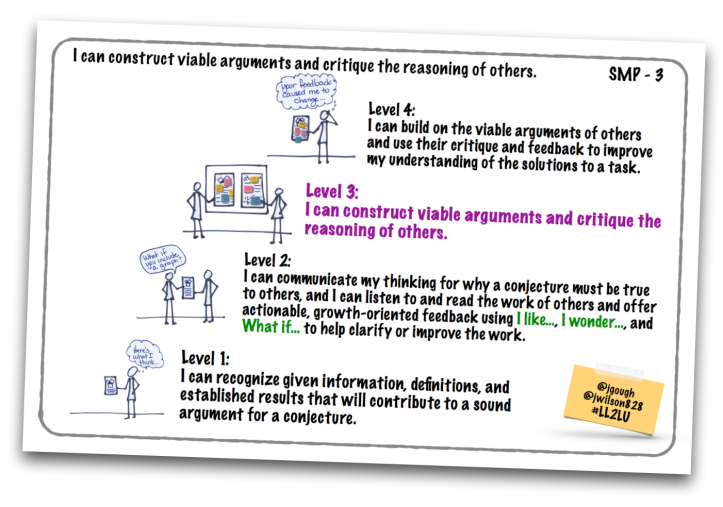We want every learner in our care to be able to say
I can construct viable arguments and critique the reasoning of others. CCSS.MATH.PRACTICE.MP3
But…what if I can’t? What if I’m afraid that I will hurt someone’s feelings or ask a “stupid” question? How might we facilitate learning and grow our culture where critique is sought and embraced?
From Step 1: The Art of Questioning in The Falconer: What We Wish We Had Learned in School.
By learning to insert feedback loops into our thought, questioning, and decision-making process, we increase the chance of staying on our desired path. Or, if the path needs to be modified, our midcourse corrections become less dramatic and disruptive. (Lichtman, 49 pag.)
This paragraph connects to a Mr. Sun quote from Step 0: Preparation.
But there are many more subtle barriers to communication as well, and if we cannot, or do not choose to overcome these barriers, we will encounter life decisions and try to solve problems and do a lot of falconing all by ourselves with little, if any, success. Even in the briefest of communications, people develop and share common models that allow them to communicate effectively. If you don’t share the model, you can’t communicate. If you can’t communicate, you can’t teach, learn, lead, or follow. (Lichtman, 32 pag.)
How might we offer a pathway for success? What if we provide practice in the art of questioning and the action of seeking feedback? What if we facilitate safe harbors to share thinking, reasoning, and perspective?
Level 4:
I can build on the viable arguments of others and take their critique and feedback to improve my understanding of the solutions to a task.
Level 3:
I can construct viable arguments and critique the reasoning of others.
Level 2:
I can communicate my thinking for why a conjecture must be true to others, and I can listen to and read the work of others and offer actionable, growth-oriented feedback using I like…, I wonder…, and What if… to help clarify or improve the work.
Level 1:
I can recognize given information, definitions, and established results that will contribute to a sound argument for a conjecture.
How might we design opportunities for intentional, focused peer-to-peer discourse? What if we share a common model to improve communication, thinking, and reasoning?
[Cross-posted on Easing the Hurry Syndrome]
________________________
Lichtman, Grant, and Sunzi. The Falconer: What We Wish We Had Learned in School. New York: IUniverse, 2008. Print.

How do I print these wonderful I can sheets?
LikeLike
Hi Jennifer,
That’s a good question. For now, here’s a link to #LL2LU SMP3 shown above.
LikeLike
[…] the leveled learning progression that Jill Gough (@jgough) and I have written for construct a viable argument and critique the reasoning of others […]
LikeLike
[…] Visual: SMP-3 Construct Viable Arguments and Critique the Reasoning of Others […]
LikeLike
[…] knows that you must have common denominators to add fractions, right? Do we know why? If asked to construct a viable argument, could we? Can we draw it, i.e., communicate why […]
LikeLike